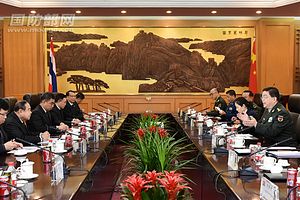China and Thailand are mulling the possibility of setting up a joint military production facility in the latest sign of an expanding defense relationship between Beijing and one of the United States’ two treaty allies in Southeast Asia.
Sino-Thai military cooperation has deepened of late amid a downturn in U.S.-Thai relations over democracy and human rights concerns that emerged following the coup in May 2014 orchestrated by the current ruling junta led by Prime Minister Prayut Chan-o-cha (“Exclusive: Managing the Strained US-Thailand Alliance”).
Both air forces held their first ever joint exercise in 2015, and Thailand has also bought battle tanks from China and selected Beijing for a multi-billion dollar contract to build its first submarines (See: “Does Thailand’s Chinese Submarine Purchase Really Signal US Drift?”). During a defense meeting between the two sides on the sidelines of a regional meeting in Laos in May, discussions had focused on areas like training, personnel exchanges, anti-terrorism cooperation, and defense industry.
In what could be another advance for this burgeoning relationship, Thai defense spokesman Khongcheep Tantrawanich said last week that Defense Minister Prawit Wongsuwan had raised the proposal of a facility to manufacture and repair armaments in Thailand during a meeting with his Chinese counterpart Chang Wanquan as part of his two-day visit to Beijing.
Khongcheep said that Prawit had proposed that the facility be both a source of weapons parts and technology transfers to Thailand and a place to manufacture and repair armaments China supplies to Thailand and other countries in the region.
Few additional details on the facility were publicly provided, including specifically which other regional countries would be covered apart from Thailand. The official statement from the Chinese defense ministry on the meeting did not explicitly mention the facility. According to the statement, Chang had said that China was willing to strengthen cooperation in fields such as “joint training and national defense industry,” while Prawit had said Thailand was committed to “deepening bilateral military cooperation in personnel raining, equipment and technology.”
But with bilateral military cooperation between the two countries now slowly expanding to include not just items such as battle tanks but also technology transfer and defense industrial collaboration, the logic of eventually establishing such a facility seems clear.
































